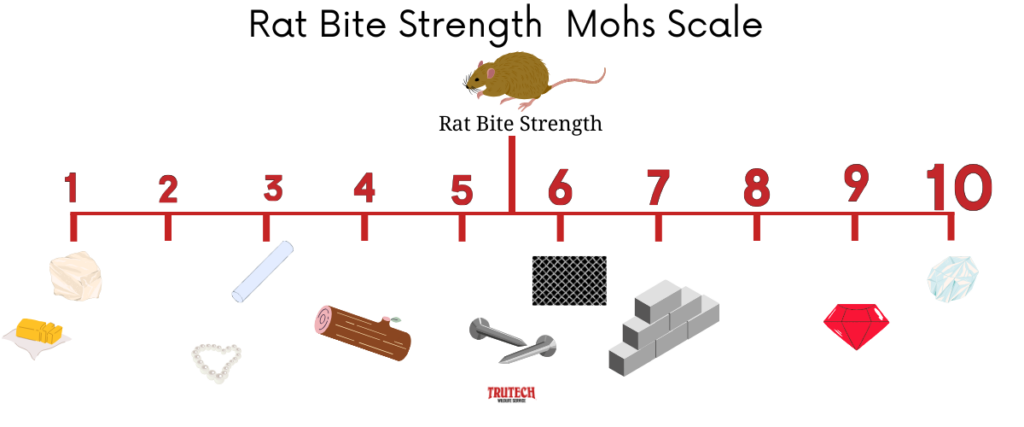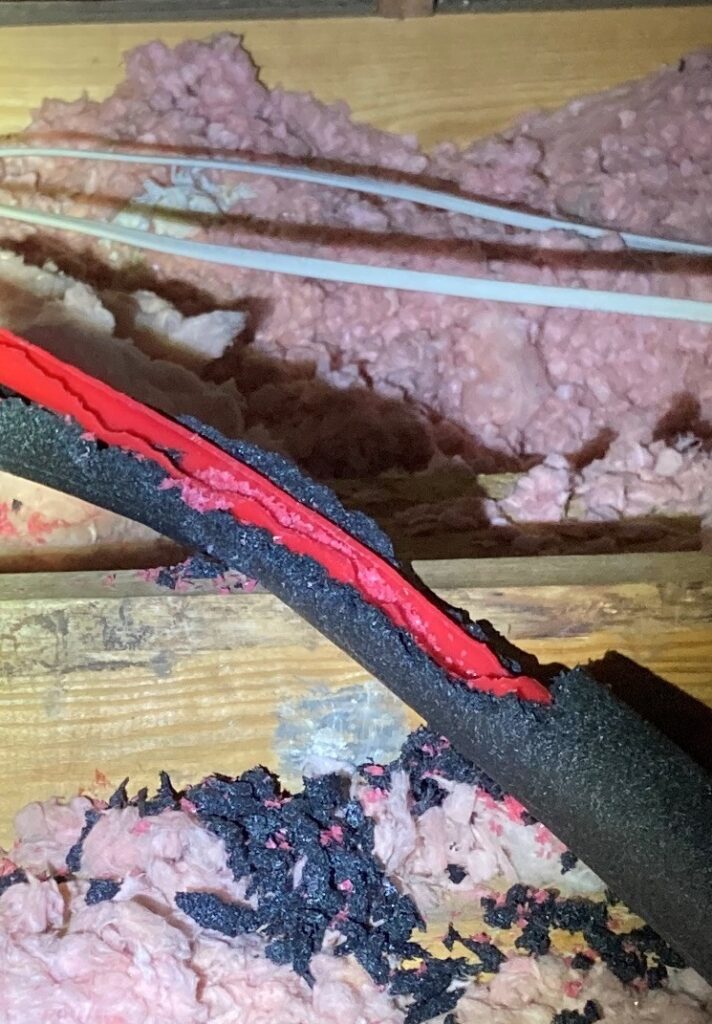One reason rat infestations should be addressed quickly is because of the damage rats can cause with their teeth alone. Rats chew through numerous types of materials making homes vulnerable to entry. A rat only needs an entry point the size of a quarter in order to gain access to a structure, so it is important for homeowners to keep an eye out for any signs of gnawing on the structures of their homes, as it could signal a rat problem or other wildlife issue.
Why Do Rats Gnaw?
Like all rodents, rats have open-rooted dentition, meaning that their front teeth—which are called incisors—grow continuously throughout their lives. In order to prevent them from growing too long, rats must consistently gnaw on things to wear them down. The incisors have hard enamel only on the front surface, with soft dentin on the back. As the rat gnaws, the soft dentin wears off before the enamel does, guaranteeing a sharp-angled cutting edge.
Rats have powerful bites. Some estimates placing their bite force at around 6,000 pounds per square inch. That’s more force per square inch than alligators or sharks. This perpetual gnawing, when combined with the rat’s extremely powerful jaws, make rats uniquely destructive animals, with the ability to shred through a wide array of materials.
What Can Rats Gnaw Through?
- Aluminum
- Bricks
- Cardboard
- Cinder blocks
- Drywall
- Electrical wires
- Lead
- Plastic
- PVC pipe
- Roof Shingles
- Sheetrock
- Vinyl Siding
- Window Screens
- Wood (cabinets, baseboards)
What Can't Rats Chew Through?
While they have strong teeth, rats cannot chew through everything. Materials like solid concrete and hard metals such as steel, and titanium are all immune to rats’ incisors.
Yes! Walls are a favorite nesting spot for rats. They can gain access to wall voids from attics and then chew holes to get inside your home.

The Mohs scale was developed in 1812 to measure gemstones and minerals’ ability to scratch other materials. It can be used to understand the strength of materials. Rat teeth are ranked 5.5 on this scale.
Why Do Rats Gnaw on Electrical Wires?
It is quite common for rodents to gnaw on electrical wires. Not only do wires provide first-rate gnawing material, but they are thought to attract rats specifically. According to a 2018 Car and Driver article, rats might be attracted to wires for several reasons: they appear similar to twigs and grasses, there is some evidence that the electrical current in wires creates a vibration which could mimic an insect, and/or they find the soy used in modern wire insulation palatable.
Regardless of the reasons behind rats’ affinity for gnawing wires, this creates a fire risk, which is why it’s very important to take measures to exclude rats from your property.

How to Keep Rats from Gnawing into Your Home
Due to their ability to chew through a variety of building materials, keeping rats out of your home can be difficult. With that said, there are a number of things homeowners can do to prevent rat infestations:
Eliminate food sources. Many homeowners make it too easy for rodents by leaving food, especially pet food, out in the open for these opportunistic creatures to feast on. Store food in sealed containers, and if you have birdfeeders, consider moving them further away from the house or even taking them down completely until the issue has been dealt with.
Seal Gaps. Rats and mice can squeeze through some impossibly tight spaces. Sealing gaps using caulk with stainless steel wool and wire mesh will ensure that these critters stay out.
Do NOT Try Natural Deterrents. There are several widely available, non-toxic household items that homeowners swear keeps rats at bay, such as:
- Peppermint oil
- Pepper flakes
- Ammonia/vinegar mixture
- Dryer sheets
There is no evidence of the efficacy of these natural deterrents. They might work in slowing down a rat infestation, but an already established rat population will most likely ignore or avoid the deterrents.
Call a Professional. Rats are notorious for their destructive capacity, the staggering rate at which they breed, and the diseases they transmit, which include typhus and Hepatitis E. All of these factors together can make driving out rats from a home a exceedingly arduous process. Call Trutech today to find out about our rodent control plan.



